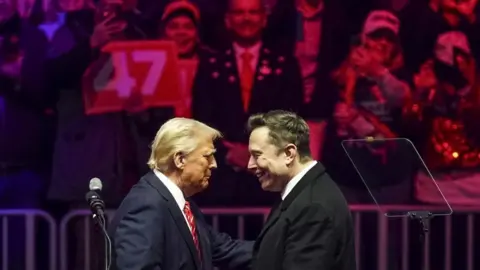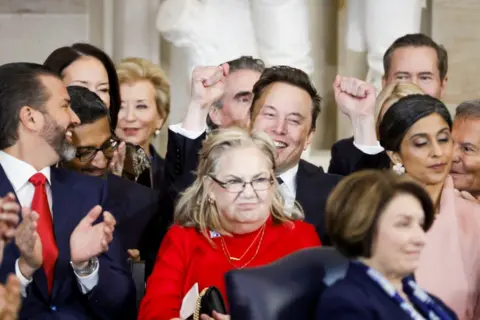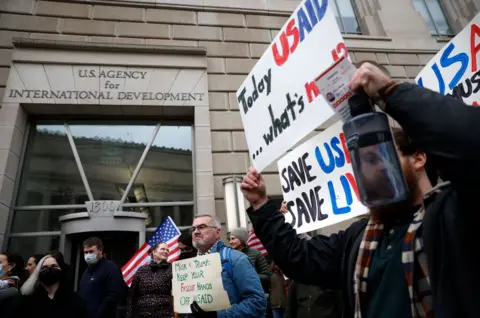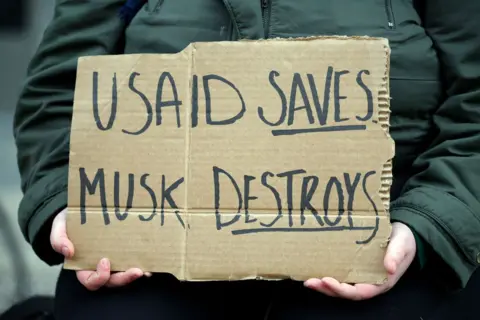Trump ally Musk is remaking government - but will they clash?
 EPA
EPAAfter days of speculation over the precise role the world's richest man would play in Donald Trump's White House - how much power he would hold, whether he is a government employee at all - he took to the social media platform he owns to clarify.
"My preferred title is just 'Tech Support,'" Elon Musk wrote on X on Tuesday. It was a knowing understatement.
As the head of the nascent Department of Government Efficiency (Doge), Musk has emerged as a dominant force in the dizzying start to Trump's second administration.
In just two weeks he has led efforts to seize access to the federal payment system, dismantled an entire agency and offered millions of civil servants an ultimatum - quit or face being fired.
But Musk's increasingly bold attempt to remake the federal government with the same blunt force he used to take control of companies like Twitter have put him on a collision course with the Washington establishment.
And while he has secured a place in Trump's inner circle, observers wonder if a showdown between these two powerful personalities could be looming.
Musk's journey from billionaire entrepreneur to White House power player was not straightforward. By his own accounting, Musk had - for decades - been a reliable vote for the Democrats.
But unhappy with Biden's position on issues from labour laws to transgender rights, Musk began to look to the other side of the aisle in the run-up to the 2024 presidential election.
Initially, Musk called for Trump to "hang up his hat & sail into the sunset" and had backed his rival, Florida Governor Ron DeSantis, for the Republican nomination. But he soon became the president's biggest booster, contributing $288m to Trump and other Republican candidates and becoming a key adviser on the campaign.
By the time of Trump's inauguration, Musk was his right-hand man, seated just behind the president's left shoulder on the dais - an unmistakable symbol of his influence.
"You know I always say we have to be protective of our geniuses because we don't have too many. But that one is a good one," Trump said of Musk, after welcoming him on stage at a rally the day before.
Musk has been a near constant presence in the nation's capital ever since.
 Getty Images
Getty ImagesAlmost immediately after his election Trump tapped Musk to run Doge, and this new role has seemingly empowered him in a far-reaching mission to slash and transform the federal government, pushing for massive reforms with stunning speed.
Although Trump had said Musk would not be given an office in the West Wing, the tech leader and his team have moved beds into the federal personnel office next door to the White House, according to the New York Times.
He has top secret security clearance, a Trump administration official confirmed, potentially giving him access to a broad swathe of highly classified information.
His tactics - relentless, sometimes ruthless - are reminiscent of how he ran his previous companies, former employees say.
A former programme manager at Tesla, who spoke to the BBC on the condition of anonymity to discuss sensitive matters, said Musk "did not care" about the human cost of his decisions.
"He's only concerned with the objective at hand. I think he views interpersonal issues and conflicts as ancillary things that are not worth his time," he said.
Occasionally, Musk tended toward the impulsive. The manager recalled seeing Musk fire a fellow Tesla employee on the spot over an overflowing rubbish can.
"He interpreted that as a sign that this person didn't take as much pride in his work as he should," he said. "That was the nuance to it… but at the end of the day someone got fired because they admitted that their trash can was overflowing."
The approach yielded a committed workforce, the employee said. If you were on board with Musk's mission, that single-minded focus was motivating, he said, and helped fuel regular 13 plus-hour days on the job.
"He can get more out of people than anyone else I have ever seen," he recalled, although he added that the intensity at Tesla was par for the course in Silicon Valley.
But for those in the federal government, the employee added, "it's gotta be a culture shock."
Nowhere has Musk's purported work on behalf of Trump been felt as intensely as USAID.
The government agency responsible for international development went from dispensing billions in aid to programmes around the world to an effective dead stop in just over two weeks.
Trump already curtailed USAID's work significantly when he ordered a 90-day pause in US foreign spending, while the administration reviewed the funds in order to make sure they were in line with the president's policy goals.
But in recent days, employees have watched with increasing alarm as Musk set his sights directly on USAID, labelling their agency a "criminal organisation" on X.
Musk's increasingly harsh rhetoric has coincided with equally drastic changes at USAID.
On 1 February, the USAID website stopped working; its X account appeared to vanish not long after. That same weekend, two top security officials were placed on administrative leave after a confrontation with Doge representatives over access to a secure facility used for reviewing classified information, the Washington Post and other US outlets reported.
On Monday, USAID employees were told to stay at home while hundreds of employees were locked out of their email. CBS, the BBC's US news partner, reports USAID employees are being pulled out of their respective countries worldwide by Friday.
"It's beyond repair," Musk said of the agency during his 50-minute conversation on X Spaces early Monday morning.
"I went over it with him in detail, and he agreed that we should shut it down," Musk said of his conversation with Trump. "And I actually checked with him a few times [and] said 'are you sure?'"
 Reuters
Reuters"The comments from Elon Musk have been particularly cutting, calling us a 'criminal organisation' that needs to 'die,''" said a USAID staffer, who asked not to be named because they feared retaliation from Musk and the administration.
"Coming from the wealthiest man on the planet, that feels pretty grotesque," said the staffer, who has since been put on administrative leave along with many other colleagues.
"I see foreign service officers that have spent their entire lives serving - a large part of it overseas - and the sacrifices they made," they said. "To be dragged through the mud like this is disrespectful."
The upheaval at USAID has raised concerns from Democrats and experts about whether Trump and Musk's actions are legal.
On its face, efforts by Trump and Musk to shut down USAID are "not legal because it runs afoul of what Congress has explicitly done previously," said Jon Rogowski, a political science professor at the University of Chicago who studies the separation of powers in the US government.
Congress has established USAID as an independent agency, and the legislative branch appropriates funding.
As head of the federal agencies, however, Trump does have broad authority to bring certain USAID functions under the state department's control, according to George Ingram, a senior fellow at the Brookings Institution and a former USAID deputy assistant administrator.
One such move included appointing Secretary of State Marco Rubio as the acting head of USAID, when in the past the agency had functioned independently of the state department, while following its guidance on foreign policy.
And influential Republicans in Congress appear ready to work with the administration to allow some degree of change.
"I'm supportive of the Trump administration's efforts to reform and restructure the agency in a way that better serves US national security interests," said Senator James Risch, chair of the Senate Foreign Relations Committee.
Though Musk does not have the authority to shut down or restructure USAID, the agency likely could not have been dismantled as swiftly and thoroughly without his influence.
"I cannot think of any precedent where a presidential administration has essentially handed over the reins to a private citizen, to remake and take control of the executive branch as they see fit," Mr Rogowski said.
In a statement to the BBC, White House Press Secretary Karoline Leavitt said Musk "is selflessly serving President Trump's Administration as a special government employee, and he has abided by all applicable federal laws".
 Getty Images
Getty ImagesPrior to Trump's inauguration, some of Musk's peers expressed optimism at the prospect of an injection of start-up culture in Washington.
"I think we've just had a very exciting moment," Marc Benioff, the billionaire founder and CEO of Salesforce who has been vocal in his support of Trump, told the BBC in December. "It's a new chapter for America."
"There's a lot of incredible people like Elon Musk in the tech industry and in the business community. And if you can tap the power of expertise to make the best of America, that's a great vision," he said at the time.
But two weeks into the Trump administration, some observers say not everyone in Silicon Valley is enthusiastic.
Niki Christoff, a former Salesforce executive who now runs a communication firm in DC, told the BBC that many "people in the [tech] industry seem dumbstruck by the events of the past two weeks".
"Most CEOs of publicly traded multinational tech companies want predictability. They want stability. They want a strong dollar," she added. "They want predictable supply chains, and a lot of the policies and the headlines coming out of Washington are creating anxiety and uncertainty."
Dr Philip Low, a neuroscientist and CEO of neurotechnology company Neurovigil, said Musk's playbook could wreak havoc on governmental institutions. The two were close for nearly 15 years before their relationship soured, he said.
"His pattern is to take companies, invest in them, destabilise them, and then take them over," said Dr Low, citing Twitter as an example.
"In that context, the White House is his biggest investment to date. And he is destabilising the American government now."
According to Dr Low, Musk will not be satisfied being a trusted deputy, which may set him on a collision course with the president, his boss.
"Knowing Elon as I do, he doesn't want to be number two or number three. He will want to take over," he said.
"Whatever he decides, goes," the former Tesla employee said, echoing Dr Low. "He never takes no for an answer."
After the shake-up at USAID, Trump made it clear that final authority would always rest with him.
When asked if he was happy with Musk after the upending of the agency, he said yes - "for the most part".
"Sometimes we won't agree with it, and we'll not go where he wants to go. But I think he's doing a great job," he said on Monday.
"Elon can't do and won't do anything without our approval, and we'll give him the approval where appropriate. Where it's not appropriate we won't," the president said.
"He reports in."
